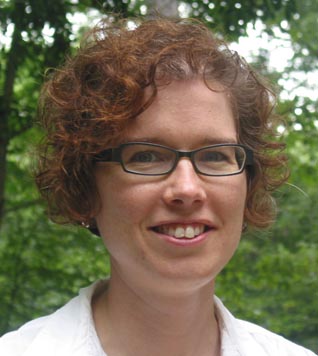Wellesley Researcher Finds Language Helps People Solve Spatial Problems
FOR IMMEDIATE RELEASE:
June 21, 2010 |
|
WELLESLEY,
Mass.— Language appears to be key in helping humans figure out the physical world.
 |
Language, above and beyond brain maturation and cultural and environmental experience, helps people solve spatial problems, according to psychologist Jennie Pyers.
Click on image for high resolution file. |
By testing people who use an emerging sign language in Nicaragua, Wellesley College Assistant Professor of Psychology Jennie Pyers and her colleagues found that people who have more complex language skills are also better at finding hidden objects. The findings will be published in the June 21 issue of the Proceedings of the National Academy of Sciences.
Pyers tested two groups of deaf people who use the sign language.
"Nicaraguan Sign Language is only about 35 years old, and as a young language it is undergoing rapid change," Pyers explained. "The language is becoming more complex in the hands of the children of the community, and most older members of the community do not learn the new complexities introduced by the following generation. As a result, the language of the younger adults in the community is more complex than the language of the older adults."
The sign language allowed Pyers to compare younger and older adult signers who share a cultural environment (Managua, Nicaragua), but who have different levels of language ability, to see how they compared in their knowledge about spatial environments.
"We found that the younger signers performed better on two spatial cognition tasks," Pyers said.
In one task, participants entered a small rectangular room with three black walls and one red wall. Identical cups were located in each of the four corners of the room. After watching the researcher hide a small object in one of the cups (to the left of the red wall), participants were blindfolded and slowly turned around until they were disoriented. They removed the blindfold and then searched for the small object.
A second task required people to rotate an object mentally. After watching the researcher hide a small object in one of four corner locations of a small box with three black walls and one red wall, the participants were blindfolded and the box was rotated. They removed their blindfold and searched for the hidden object in the rotated box.
In both experiments, the researchers found adults with more complex language skills performed better than the adults with more basic skills.
"The younger signers performed as well as the average college undergraduate," Pyers found. "The older signers performed significantly worse than the younger signers, but better than children do."
By using this unique language environment in Nicaragua, and studying two generations of adults who share same culture, Pyers and her colleagues could identify for the first time the role of language in spatial cognition.
"The study shows that language, above and beyond brain maturation and cultural and environmental experience, helps people solve spatial problems," Pyers said.
Since 1875, Wellesley College has been a leader in providing an excellent liberal arts education for women who will make a difference in the world. Its 500-acre campus near Boston is home to 2,300 undergraduate students from all 50 states and 75 countries.
### |

